What is Cloud Computing?
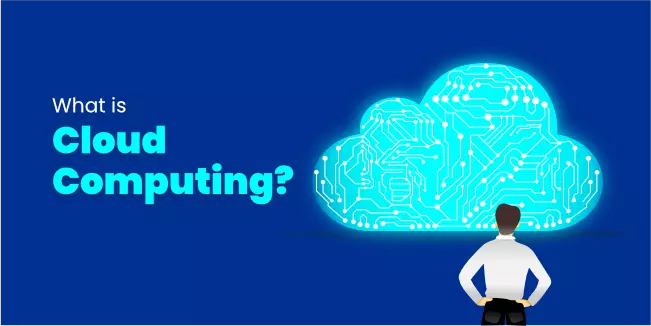
Cloud computing has been one of the most popular trends in software development in recent years. It is a field that is developing exceptionally dynamically, which means that new opportunities to use cloud computing appear now and then, not only in business and industry but also in the everyday life of each of us.
Just now, in the IT industry, it is challenging to imagine creating a mobile application or using artificial intelligence solutions or the Internet of Things without cloud computing tools.
Reliability, speed, and security are the features that make as many as 25% of companies plan to move all their applications to the cloud within the following year. The issue of cost savings, which allows companies to achieve a competitive advantage, is also significant.
But it is worth analyzing this topic to assess whether cloud computing services will help develop your company.
What is Cloud Computing?
Cloud computing (commonly referred to simply as "cloud") is a revolutionary form of on-demand service that allows you to access digital resources such as applications and data centers via the Internet and only pay for what you use. It enables users to take advantage of powerful yet cost-effective services.
Cloud computing enables data storage and instant access to a wide range of networking and storage resources, whether from your data center or a cloud service provider. Choosing the right services and deployment models for your organization can save costs while quickly introducing new products or services, easily expanding to new locations, and significantly increasing productivity.
Benefits of Cloud Computing
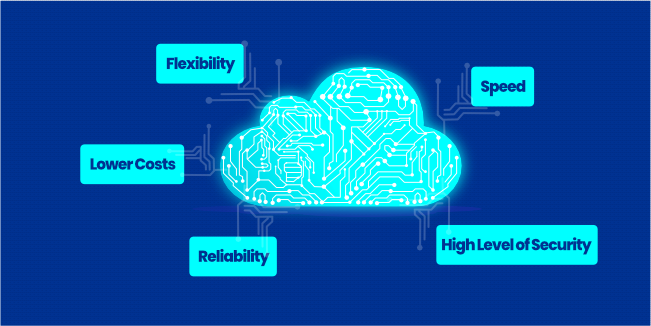
More and more companies are switching to cloud computing services due to their many advantages. Here is a list of 5 reasons why organizations prefer to move their IT resources to the cloud today:
Cloud computing means you no longer have to spend huge capital on purchasing hardware, operating systems, and software, not to mention the configuration and operation of local data centers with server cabinets, 24/7 electricity for power and cooling, or IT experts to manage the infrastructure. Thanks to cloud computing, companies can save a lot.
Cloud Computing provides your company with constant and immediate access to online files on all possible mobile and stationary devices.
Data management is faster and simpler with cloud-based networks than with traditional methods. Cloud services often operate in a pay-per-use model, allowing the opportunity to customize the offer depending on the company's current needs. Such a system ensures smooth operation while reducing expenses.
Cloud computing makes data backup and recovery processes faster, more efficient, and cost-effective. Because data is stored in multiple locations in the cloud provider's network, business continuity is guaranteed.
What makes cloud computing so beneficial is its speed. You can access massive amounts of computing power with just a few clicks, allowing businesses to get the resources they need quickly and easily - making it much more convenient than traditional methods.
A few years ago, a security issue prevented some companies from using cloud computing. However, most cloud providers currently use numerous cloud security solutions, such as private connections between local infrastructure and external data centers, advanced Anti-DDoS protection, and automatic backups. On the one hand, the solutions used help protect data and infrastructure against potential threats, and on the other hand, they make companies consider cloud computing to be a safe solution.
Types of Cloud Computing
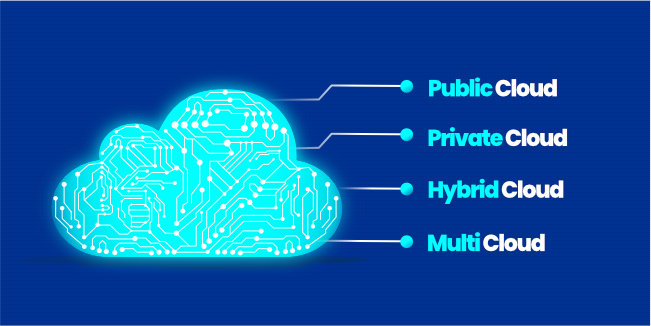
Different types of cloud computing are designed to provide the perfect solution for each individual's needs - no two clouds are the same. Each model, type, and service is tailored to various requirements, so you can access exactly what suits your unique goals.
The public cloud is a revolutionary technology that allows users to access powerful tools, applications, and computing resources without investing in expensive hardware. Cloud providers offer these services over the Internet at affordable prices in subscription or pay-per-use models, making them ideal for businesses of all sizes.
The public cloud provider is responsible for the data centers, hardware, and infrastructure that support customer workloads. It also ensures high performance by providing fast access to applications and data by providing reliable high-bandwidth network connectivity.
to applications and data by providing reliable high-bandwidth network connectivity. With minimal initial investment and rapid deployment, public cloud services are ideal for a timely go-to-market.
A private cloud offers the perfect combination of features and benefits that sets it apart from other cloud types. With a private cloud, you get all the benefits of cloud computing, such as flexibility, scalability, and ease of service delivery, along with enhanced security and access control capabilities that are not available in public or hybrid clouds. Here, every aspect - from the cloud infrastructure to the computing resources - is intended solely for the user's use, which makes this environment ideally suited to specific requirements.
A private cloud is usually hosted in the customer's data centers. Still, it can also be accessed through an independent service provider or hosted on rented servers in a third-party data center. This option provides greater flexibility and scalability for businesses with unique requirements.
Private clouds are often the only viable option when meeting regulatory compliance requirements. Companies that deal with sensitive data, intellectual property, personal information, medical records, or financial data will most likely choose a more secure private cloud over a public cloud due to its sensitive nature.
A hybrid cloud is a combination of public and private cloud resources. Both clouds remain separate entities that, thanks to technologies, ensure the sharing of data and applications between them. With the ability to pool resources, a hybrid cloud gives your business more flexibility and deployment options. It helps you optimize your existing infrastructure, security, and compliance.
Multicloud uses two or more clouds from two or more different cloud service providers. The distribution of resources between environments depends on the requirements of a given company. Multicloud allows you to choose services from different environments that best suit your company's technological and business needs.
Using a multicloud allows you to become independent from one provider. Even when tech giants provide excellent support for public clouds, downtime and failures can happen. In the case of multicloud, even if one provider struggles, the distributed system will continue to function (at least partially). In addition, multicloud enables the use of multiple cloud services that are not available in other types of cloud computing.
Cloud Computing Services
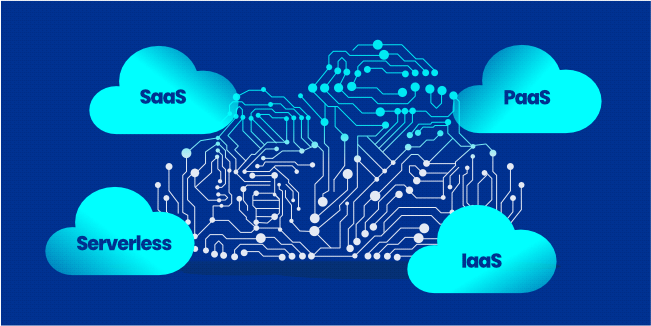
Cloud computing services can be organized into 4 basic categories that simplify the implementation of business goals:
- SaaS (Software as a Service)
- PaaS (Platform as a Service)
- IaaS (Infrastructure as a Service)
- Serverless
They are popularly referred to as "stack" because they all work together. Understanding how each of them works is the key to using them effectively.
-
SaaS (Software-as-a-Service)
Software as a Service (SaaS) is an innovative way to deliver applications over the Internet, allowing customers to access them anytime without having to install or maintain anything on their computer. With SaaS, cloud service providers host and manage all aspects of the software and take care of installation updates and security patches. Users can use any web browser from their phone, tablet, or laptop to connect to the online application quickly and securely. The SaaS service can be dynamically scaled to meet individual users' needs.
-
PaaS (Platform-as-a-Service)
Platform as a Service (PaaS) is an on-demand cloud computing service designed to make life easier for developers. It allows them to quickly develop, test, and manage applications without setting up or maintaining server infrastructure such as storage units, networks, and databases. PaaS simplifies development without sacrificing build quality.
-
IaaS (Infrastructure-as-a-Service)
Infrastructure as a Service (IaaS) is the primary form of cloud computing. Instead of spending large sums on IT infrastructure, IaaS allows you to rent servers, virtual machines, storage space, networks, and operating systems from a cloud service provider at an affordable price based on specific usage requirements.
Unlike SaaS and PaaS, IaaS provides users with the most basic control over cloud computing resources.
Serverless Computing focuses on building application functionality without taking the time to manage servers and the infrastructure required to do so constantly. The cloud provider takes care of all the tasks related to managing the back-end infrastructure. It allows developers to focus on code development and application logic.
With serverless architectures, scalability is no longer an issue, as resources are only used when a specific trigger or function is present. It makes them highly event-driven and cost-effective for businesses of all sizes.
Uses of Cloud Computing
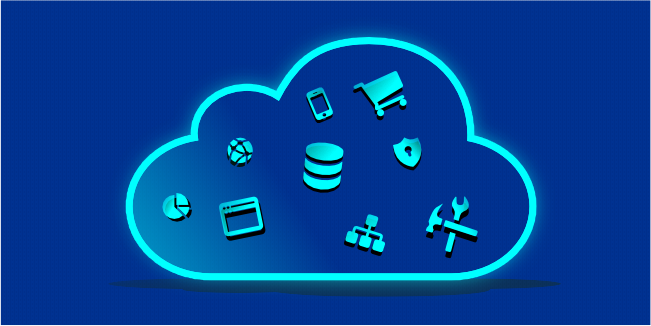
The possibilities for using cloud computing are almost unlimited. Every day there are new ideas and opportunities. Everything that involves the storage and processing of vast amounts of data that requires massive computing power is the goal of cloud computing. In addition, cloud computing helps developers streamline the development process so that operational tasks related to, for example, the implementation of Agil or DevSecOps run smoothly and do not constitute an element blocking the entire process. Below you will find some of the most typical examples of using cloud computing:
In the past, companies were forced to invest in internal servers and shared hosting solutions that often did not meet their needs. However, thanks to cloud computing, entrepreneurs can access reliable technology at an affordable price - allowing them to start their business confidently and focus on scaling it.
The use of cloud computing drastically reduces the cost of mobile application development while shortening its duration. Instead of building from scratch, it is much easier to use pre-existing infrastructure.
The risk of data loss can destroy a business, and storing it on your servers is too impractical to consider. Cloud computing offers the security of all stored information.
Cloud computing not only gives you the ability to organize data but also allows you to use cloud services for better analysis. It can help you plan your activities and operations more effectively and build your company's strategy.
Summary
Cloud computing will play an increasingly important role. Along with technological development, better tools, services, and a more comprehensive range of possibilities will appear. Cloud computing services are for every company, regardless of its size or level of income. The undoubted advantages of cloud computing, such as a higher level of security, better scalability, or cost optimization, mean that companies no longer wonder whether to use this solution but when to implement it.